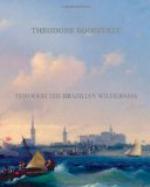On the 21st we made another good run, getting down to the Inferno rapids, which are in latitude 8 degrees 19 minutes south. Until we reached the Cardozo we had run almost due north; since then we had been running a little west of north. Before we reached these rapids we stopped at a large, pleasant thatch house, and got a fairly big and roomy as well as light boat, leaving both our two smaller dugouts behind. Above the rapids a small river, the Madeirainha, entered from the left. The rapids had a fall of over ten metres, and the water was very wild and rough. Met with for the first time, it would doubtless have taken several days to explore a passage and, with danger and labor, get the boats down. But we were no longer exploring, pioneering, over unknown country. It is easy to go where other men have prepared the way. We had a guide; we took our baggage down by a carry three-quarters of a kilometre long; and the canoes were run through known channels the following morning. At the foot of the rapids was a big house and store; and camped at the head were a number of rubber-workers, waiting for the big boats of the head rubbermen to work their way up from below. They were a reckless set of brown daredevils. These men lead hard lives of labor and peril; they continually face death themselves, and they think little of it in connection with others. It is small wonder that they sometimes have difficulties with the tribes of utterly wild Indians with whom they are brought in contact, although there is a strong Indian strain in their own blood.
The following morning, after the empty canoes had been run down, we started, and made a rather short afternoon’s journey. We had to take the baggage by one rapids. We camped in an empty house, in the rain. Next day we ran nearly fifty kilometres, the river making a long sweep to the west. We met half a dozen batelaos making their way up-stream, each with a crew of six or eight men; and two of them with women and children in addition. The crew were using very long poles, with crooks, or rather the stubs of cut branches which served as crooks, at the upper end. With these they hooked into the branches and dragged themselves up along the bank, in addition to poling where the depth permitted it. The river was as big as the Paraguay at Corumba; but, in striking contrast to the Paraguay, there were few water-birds. We ran some rather stiff rapids, the Infernino, without unloading, in the morning. In the evening we landed for the night at a large, open, shed-like house, where there were two or three pigs, the first live stock we had seen other than poultry and ducks. It was a dirty place, but we got some eggs.
The following day, the 24th, we ran down some fifty kilometres to the Carupanan rapids, which by observation Lyra found to be in latitude 7 degrees 47 minutes. We met several batelaos, and the houses on the bank showed that the settlers were somewhat better off than was the case farther up. At the rapids was a big store, the property of Senhor Caripe, the wealthiest rubberman who works on this river; many of the men we met were in his employ. He has himself risen from the ranks. He was most kind and hospitable, and gave us another boat to replace the last of our shovel-nosed dugouts. The large, open house was cool, clean, and comfortable.




